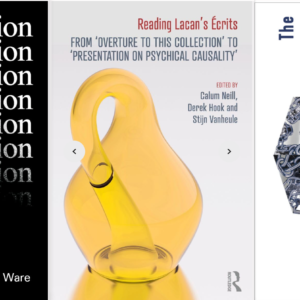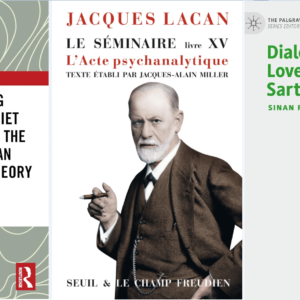News – September 2018
Alain Badiou’s Lacan, drawn from his year-long anti-philosophy seminar on Lacan, has now been published by Columbia University Press. In it, Badiou approaches Lacan as one such anti-philosopher, arguing for the challenge he posed to fundamental philosophical ideas around truth, being, and the nature of subjectivity. Heavily influenced by Lacan in his formative years, Badiou attended Lacan’s Seminar since the 1960s and sat on the editorial board of Cahiers pour l’Analyse. He is now one of the world’s foremost philosophers, emeritus professor of philosophy at the École normale supérieure in Paris, and has authored a number of other works using Lacanian theory, including and There’s No Such Thing as a Sexual Relationship: Two Lessons on Lacan (with Barbara Cassin, 2017).
Psychoanalysis and Hidden Narrative in Film, by Trevor C. Pederson, will be published by Routledge in October. Along with introducing a new psychoanalytic methodology for film interpretation, all the concepts in the psychoanalytic model used are accompanied by clinical examples. Lacanians should be interested in the careful explication of Freud and the clinical innovations Pederson introduces which make use of the body. A further description, reviews, and contents are available on the Routledge site.
Jacob Johanssen’s Psychoanalysis and Digital Culture: Audiences, Social Media, and Big Data is due to be published by Routledge on 19th October. It offers a comprehensive account of the contemporary media environment and an introduction to the psychoanalytic affect theories of Freud and Didier Anzieu (son of Lacan’s patient Aimée, and the subject of his doctoral dissertation). Lacan is also discussed in one chapter. A preview of the contents is available on the Routledge site, and it is also available to buy from Amazon.
Available now in the UK, and due to be published in the coming month in the US, is Lacan on Psychosis: From Theory to Praxis edited by Jon Mills and David L. Downing and published by Routledge. It aims to distill Lacan’s views on psychosis for both a specialised and non-specialised audience, and contains contributions by Lacanian authors less well-known within the Anglo-Saxon world. This includes a chapter on ‘Problems of Femininity in the Psychoanalytical Treatment of Psychotic Women’ by the Quebec-based trio Willy Apollon, Danielle Bergeron, and Lucie Cantin, who run the Psychoanalytic Treatment Center for Young Adult Psychotics, also known as The 388.
Further ahead for publication next year, Psychoanalysis between the Child and the Other: Exploring the Cultures of Childhood, by Liora Stavchansky, will be released in January by Routledge. Its focus is on topology and what it can offer to clinicians working with children, to develop a way in which structure, structuring, and playing can be thought. It draws on Lacan’s late work in the field of topology, and his conceptions of the child itself, to offer ways for researchers to venture into “cultures of childhood”.
Also announced for publication by Bloomsbury Academic in July next year is Matthew Clarke’s Lacan and Education Policy: The Other Side of Education. Clarke uses Lacan’s four discourses in a critique of recent education policy and the neoliberal model, referencing psychoanalysis to argue for a shift in focus onto the possibility of education offering a space of ‘becoming’ (the ‘other side’ of education).
Among the journals, the open access journal ‘Language and Psychoanalysis’ is currently accepting manuscripts for Volume 8, Spring/Summer Issue 2019. Articles accepted for publication will be available as online first publications, expediting access to the latest peer-reviewed research. The manuscript submission due date is 30th April 2019. ‘Language and Psychoanalysis’ is a fully peer reviewed online journal that publishes twice a year and welcomes a wide range of original contributions that further the understanding of the interaction between Linguistic Analysis and Theory & Psychoanalytic Theories and Techniques. Any relevant manuscripts with an emphasis on language and psychotherapy will be considered. The journal also publishes short research reports, book reviews, interviews, obituaries, and readers’ comments. Details on how to submit are on the journal’s site at http://www.language-and-psychoanalysis.com/.
Among events, a Call for Papers has been issued for the LACK iii conference, on Psychoanalysis & Separation, which will take place 9th-11th May next year at Clark University, in Worcester, Massachusetts. Keynote speaker will be Lee Edelman of Tufts University. The conference hopes to bring together those interested in exploring the philosophical and cultural implications of psychoanalytic theory, especially as it relates to the question of contemporary politics. Though practitioners are welcome, the focus of the conference is psychoanalytic theory rather than practice, and theoretical papers will be privileged.
The Department of Psychoanalysis and Clinical Consulting at Ghent University is organising a Specialist Course for 7th-9th January next year undertaking a close reading of ‘Lacan’s ‘Kant with Sade’ and its Relevant for Today’s Culture and Clinic’. Prof Dany Nobus, who’s book on the same topic was published in October last year, will be the guest speaker. The three-day event will comprise 18 hours of teaching in total with each section adopting the format of an ‘integrated lecture’, with ample time for discussion and exchange of ideas.
The Argument for the 2019 NLS Congress, Urgent!, has now been released, written by NLS President Bernard Seynhaeve. Pointing out that Lacan discussed what he called “urgent cases” and “subjective urgencies” in texts from and 1967 and 1976, Seynhaeve locates this urgency as the establishing point of the transference, sitating it at the moment of subjective destabilisation as a traumatic point in which the signifying chain has undergone an “acute rupturing”. Urgency is also, for him, “always something that pushes, that urges, that presses and that is beyond transference”. The Congress itself will take place 1st-2nd June 2019 in Tel Aviv – more details to follow.
The European Forum of Zadig, entitled Discourses which Kill, will take place in Belgium on 1st December. Between now and then, the blog for the event will publish preparatory texts towards the Forum in English, French, Spanish, or Dutch and submissions are welcome. Registration for the event is open here and the Argument in full can be read here.
PIPOL 9, the 5th European Congress of Psychoanalysis, has been announced to take place 13th-14th July 2019 in Brussels. It carries the title ‘The Unconscious and the Brain: Nothing in Common’ and is hoping to bring together “more than 150 practitioners to demonstrate the validity of the effects and consequences produced – clinical and therapeutic – working on the assumption of the psychoanalytic unconscious”. More details here, pending the update of the official site.
Après-Coup Psychoanalytic Association in New York is organising the first meeting of its Reading Group on Freud’s Case Studies, with Mark Stafford and Martin Winn, on 23rd October. The series will continue through to May 2019. More details and how to register are on the group’s site, or at the Facebook page for this event. Also coming up from the Association is Adriana Passini’s online study group which will meet on 17th October to discuss ‘The Graph of Desire and its Clinical Implications’. Details of how to register for the virtual event are also on its Facebook event page.
Genevieve Morel will be in conversation with Darian Leader at the Freud Museum London on 14th December to discuss her new book, The Law of the Mother: An Essay on the Sexual Sinthome, which will be released on 20th November in the US and is available now in the UK. More details and a link to book is on the Freud Museum’s site.
The London Society of the NLS will be hosting Yves-Claude Stavy for a study day on ‘Neuroses, Today: What patients tell us about neurosis, its constitution and clinic’, on Saturday 27th October in London. More details on the Society’s site.
In Sydney, Australia, the NIDA Lacan Study and Reading Group will meet for monthly seminars, with topics and dates announced on the NIDA site here. The latest paper, presented in the September seminar by Dr Ehsan Azari, was ‘Derrida, Psychoanalysis, and Lacan: From Resistance to Love’, and is available to read via that link.
Lastly, The Colorado Analytic Forum of the Lacanian Field is running a Forum Film series, each third Friday of the month. The next meeting will be on 19th October and admission is free and open to all. More details on the event page on Facebook.
Got news? Get in touch.




Leave a Reply